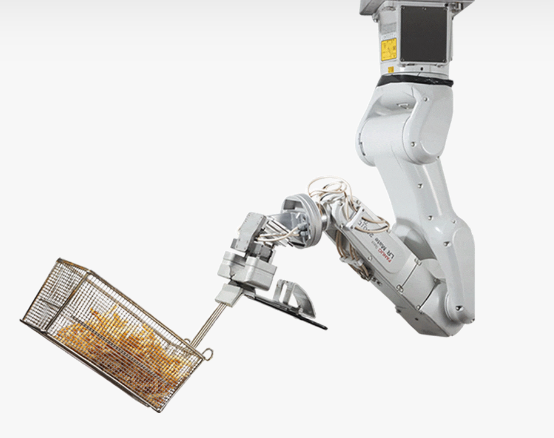
Like a haymaker’s punch, the COVID pandemic completely rocked the restaurant industry, benefiting many – but leaving many others to either shut down entirely or scramble to restructure their business models.
In RI, we saw The Grange, Nick’s on Westminster, and El Rancho Grande close in the pandemic. The owners of JP Spoonem’s took the pandemic as an excuse to retire. And post-pandemic, many eateries, like Bagel Gourmet, remain take-out only.
2020 also brought us The Great Resignation, where overworked and underpaid employees took the societal shift as a call to demand a better quality of life.
All the while, slowly, quietly, the fast food industry continued their march towards automation.
When low contact became key to keeping the spread of disease at bay, drive-thru service boomed. Keeping drive-thru lines flowing kept the cash flowing.
In response, major chains like McDonald’s and White Castle began implementing what they call “smart menus.” When you pull up to a drivethru, you are increasingly likely to be greeted by a friendly, femalevoiced AI assistant – not unlike the ubiquitous tones of Susan Bennett, Brown graduate and voice of Siri, Apple’s AI assistant.
Automation is not new to fast food though. In fact, automation is its life blood – beginning right here in RI with Walter Scott, the father of the American diner. As a young hustler in the streets of Providence, Scott began his business peddling sandwiches and coffee to hungry night workers.
In 1872, Scott opened up what could be called the country’s first food truck. Rather than sitting in a tavern or waiting for a home-cooked meal, busy third-shift workers could stop by Walter Scott’s horse-drawn “lunch wagon.” You could call Haven Bros in Providence a modern version of Walter Scott’s wagon.
From the lunch wagon, we got the train car diner – a drive-up restaurant with quick service and simple menus for lonely travelers. RI has quite a few, including Modern Diner and Miss Lorraine Diner in Pawtucket and the West Side Diner on Westminster in Providence.
Not long after, the drive-up diner morphed into the drive-in restaurant. At a drive-in, you didn’t even have to get out of your car. With car hop service, an attendant would bring the food out to you. RI still has a couple, like the A & W Restaurant in Smithfield and Evelyn’s Drive-In in Tiverton.
The drive-in restaurant was a little too slow for today’s busy eaters, so most of us are more familiar with the drive-thru restaurant, which first opened in 1947. Red’s Giant Hamburg on the famous Route 66 in Springfield, Missouri lays claim to the title of first drive-thru restaurant. Soon after, In-N-Out Burger and Jack in the Box quickly followed suit.
Though McDonald’s is probably most synonymous with drive-thru food, early McDonald’s restaurants operated more like drive-in restaurants. But speed and efficiency were always a part of the formula. Famously depicted in the 2017 film, The Founder, the McDonald brothers perfected a Henry Ford-esque ballet for crafting a quick, consistent, quality burger and fries.
So it seems only natural that in 2023, White Castle would partner with Miso Robotics to roll out its fast and highly-efficient robotic fry-cook named “Flippy.” Flippy can’t catch COVID. Flippy doesn’t need benefits. And Flippy doesn’t give you attitude.
The story, though brewing since 2020, comes right out of the plot for the recently released Good Burger 2. Filmed this past summer at a former Friendly’s on Mineral Spring Ave, Good Burger 2 tells the story of Ed (Kel Mitchell), owner of Good Burger, getting bought out by a tech conglomerate who then automates the staff with AI and robotics.
But after thwarting the tech takeover in the climax of the film, Ed says, “We just proved something very important. People will never be replaced by technology. Because no machine can do a job as efficiently as a human being.” He says this, by the way, while being accosted by a customer whose drink order he messed up (so he physically scoops the ice cubes out of the drink to fix it).
In a world of AI take-over, Good Burger’s Ed is a modern day John Henry – a burger-flippin’ man. But when automation is the driving force of fast food history, why fear AI?
Part of the fear comes from people’s perception of what AI is. We’ve had nearly a century of science fiction telling us that robots will replace us. So anytime someone mentions AI, we think, “Am I going to get Terminatored?” But lots of what marketing companies call AI is really just an algorithmic tree – no different from the virtual receptionist you talk to whenever you call customer service.
It’s certainly annoying when you’re trying to talk to your doctor. But is it so bad when you’re ordering a large, no ice from Dunkin’?